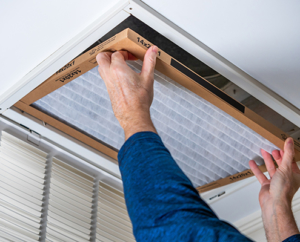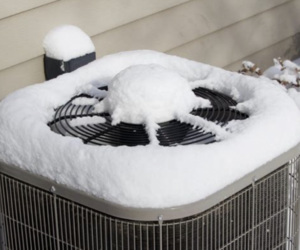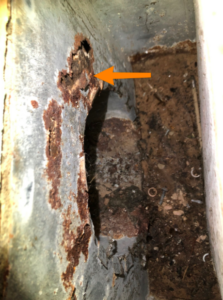Furnace Filter Maintenance
Regular Home Maintenance
Part of responsible homeownership includes, of course, regular home maintenance. And there are some tasks that, if deferred, can lead to a home system that’s inefficient and overworked, which can result in problems and expenses. We often see this on our home inspections. One such task is changing the air filter of the home’s HVAC system. Air Filter Maintenance is simple and inexpensive, and taking care of it at least every three months can mean the difference between optimum comfort and avoidable repairs.
What Can Go Wrong
Most homes have some sort of furnace or heat pump, and many of those homes (especially newer ones) have combined heating, ventilation and air-conditioning or HVAC systems. Each type uses some type of air filter or screen to prevent larger airborne particles (up to 40 microns) from entering the system and clogging sensitive machinery. A system that has a dirty filter can suffer from pressure drop, which can lead to reduced air flow, or “blow-out,” resulting in no air infiltration at all. Any of these conditions can cause the system to work harder to keep the home warm or cool (depending on the season and the setting). And any mechanical component that has to work harder to run efficiently puts undue stress on the whole system, which can lead to premature failure, resulting in repair or replacement.
Also, a dirty filter that’s exposed to condensation can become damp, which can lead to mold growth that can be spread throughout the home by the HVAC system. This can lead to serious health consequences, not to mention a compromised unit that will likely require servicing and may require replacement, depending on the severity of the moisture problem.
Types of Filters
Most HVAC and furnace filters are disposable. They are made of biodegradable paper or similar media, and shaped in cells, screens or fins designed to trap as much airborne debris as possible. Filters can typically be purchased in economical multi-packs, and there are many types that will fit different models of furnace/HVAC units. It’s important to use the appropriate filter for your unit; using the wrong filter that doesn’t fit the unit properly can create the same types of problems as having a dirty filter. Your HVAC installer can show you where the filter goes and how to remove the old one and install a new one. Your unit may also have an affixed label with directions for easy filter replacement.
How Often?
Your HVAC or furnace technician should service your unit once a year. Because a furnace/HVAC unit contains moving parts, it’s important that belts are not cracked and dry, ventilation ductwork is not gapped, cracked or rusted, and components, such as coils and fans, are clog-free and adequately lubricated for unimpeded operation. This sort of evaluation is best left to the professional, unless you’ve had the appropriate training.
The filter of the unit, especially if it’s an HVAC unit that will tend to get nearly year-round use, should be changed by the homeowner at least every three months, but possibly more often.
Check your filter’s condition and change it once a month if:
- You run your unit six months a year to year-round.
- You have pets. Pet dander can become airborne and circulate through the home’s ventilation system just as typical household dust does.
- You have a large family. More activity means more household dust, dirt and debris.
- You smoke indoors.
- You or someone in your household suffers from allergies or a respiratory condition.
- You live in a particularly windy area or experience high winds for extended periods, especially if there are no nearby shrubs or trees to provide a natural windbreak.
- You live in an area prone to or having recently experienced any wildfires. Airborne ash outdoors will eventually find its way indoors.
- You have a fireplace that you occasionally use.
- You live on a working farm or ranch. Dust and dirt that gets kicked up by outdoor work activity and/or large animals will be pulled into the home’s ventilation system, especially through open windows.
- You have a large garden. Depending on its size and how often you work it, tilling soil, planting, pulling weeds, using herbicides and pesticides, and even watering mean that dirt, chemicals and condensation can be pulled into your home’s ventilation system.
- There is construction taking place around or near the home. You may be installing a new roof or a pool, or perhaps a neighbor is building a home or addition. Even if the activity is only temporary, dust and debris from worksites adjacent to or near the home can be sucked into the home’s ventilation system, and this increased activity can tax your HVAC system.
Change the filter immediately if:
- The filter is damaged. A damaged filter won’t work as intended.
- The filter is damp. A filter affected by moisture intrusion, system condensation, or even high indoor humidity can quickly become moldy and spread airborne mold spores throughout the home via the ventilation system.
- There is evidence of microbial growth or mold on the filter. Mold spores already infiltrating the home via the HVAC system are not only bad for the unit itself, but they can pose a health hazard for the family, ranging from an irritated respiratory system to a serious allergic reaction.
Tips on Changing the Filter
- Turn off the unit before replacing the filter.
- Use the right sized filter for your unit.
- Follow the directions for your unit to make sure you’re installing the filter properly. For example, many filters have different colors for the front and back (or upstream and downstream flow) so that they’re not installed backwards.
- Make sure there aren’t any gaps around the filter frame. If this is the case, you may have the wrong size filter, or the filter itself may be defective or damaged.
- Use a rag to clean up any residual dust before and after you replace the filter.
- Securely replace any levers, gaskets and/or seals.
- Turn the unit on and observe it while it’s operating to make sure the filter stays in place.
- Note the date of filter replacement in a convenient location for the next time you inspect it. A filter that becomes dirty enough to change within a short period of time may indicate a problem with the unit or ventilation system, so monitoring how often the filter requires changing is important information for your technician to have.
Call a technician for servicing if:
- Your unit fails to turn back on.
- The fan is slow, making an excessive noise, or the fins are bent.
- The coils are excessively dusty or clogged.
- You notice moisture intrusion from an unknown source anywhere in the system.
Homeowners who take care of the easy task of changing their HVAC filter can help prevent system downtime and avoidable expenses. This is an easy way to keep their families living and breathing comfortably. Your InterNACHI inspector can provide more useful tips and reminders during your Annual Home Maintenance Inspection
Home Run Inspections, LLC
Oklahoma: 405-905-9175
We Cover All the Bases!
Serving the Oklahoma City metro and surrounding areas including Edmond, Yukon, Piedmont, Bethany, El Reno, Tuttle, Mustang, Moore, Norman. We also provide services in Midwest City, Del City, Choctaw, McCloud, Shawnee, Harrah, Newalla, Jones, and more.
Also Now Serving the Florida Panhandle metro areas including Destin, Fort Walton Beach, Okaloosa Island, Miramar Beach, Santa Rosa Beach. We also provide inspections in Niceville, Shalimar, Freeport, Crestview, DeFuniak Springs, Panama City Beach, and more.
Schedule Your Inspections Online at:
Like us on FaceBook
Follow us on Twitter
Follow us on Instagra
#homemaintenance #filter #furnacefilter #hvac #homeruninspections #homeinspectors #homeinspectorokc #homeinspectornearme #inspectionservices #realestateagent #realestateinvestment #OKCRealEstate



 “It’s Hot in Here”
“It’s Hot in Here”


